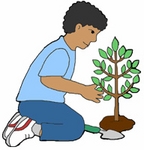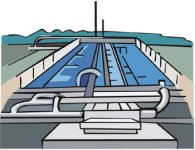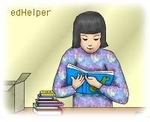
Worksheets and No Prep Teaching Resources
Reading Comprehension Worksheets
Caring for Earth

Caring for Earth
 Worksheets and No Prep Teaching Resources Reading Comprehension Worksheets Caring for Earth |
 Caring for Earth |
| edHelper's suggested reading level: | grades 7 to 9 | |
| Flesch-Kincaid grade level: | 8.77 |
|
The Wet Treatment, Part 1
By Trista L. Pollard |

|
 1 You have just spent a normal weekend day at home. In between watching television and reading, you have listened to the everyday sounds of your house: the dishwasher rinsing your dishes; the washing machine cleaning your clothes; and your family flushing your toilet a few times. All three activities have one thing in common- water! Have you ever wondered what happens to the water after it leaves your house? The thought may not have crossed your mind; however, scientists, like hydrologists who study our water supply, think about the destination of our wastewater daily.
1 You have just spent a normal weekend day at home. In between watching television and reading, you have listened to the everyday sounds of your house: the dishwasher rinsing your dishes; the washing machine cleaning your clothes; and your family flushing your toilet a few times. All three activities have one thing in common- water! Have you ever wondered what happens to the water after it leaves your house? The thought may not have crossed your mind; however, scientists, like hydrologists who study our water supply, think about the destination of our wastewater daily. |
Create Weekly Reading Books
Prepare for an entire week at once! |
| Leave your feedback on The Wet Treatment, Part 1 (use this link if you found an error in the story) |
 |
Caring for Earth
|
 |
High School Reading Comprehensions and High School Reading Lessons
|
 |
Earth Day Activities, Printables, Worksheets, and Lesson Plans for Kids
|
 |
Science
|